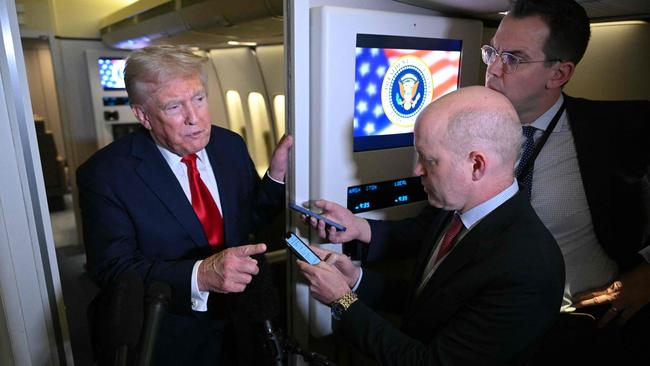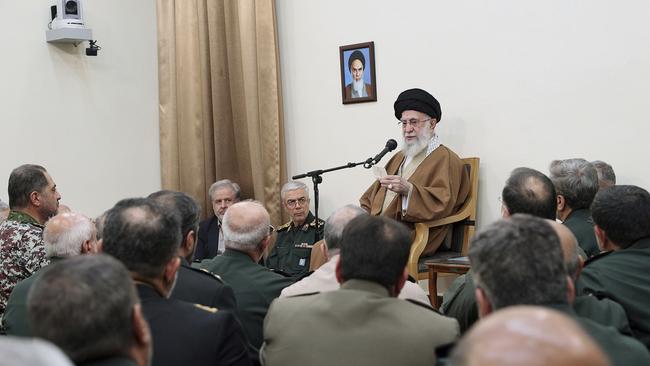Trump ‘will make decision on Iran quickly’ amid nuclear talks
Donald Trump says he’s met his advisers after US and Iran officials met in Oman for talks on Tehran’s nuclear program, with the next talks set for Rome.

Donald Trump has said he expects to make a decision on Iran very quickly, after the US and Tehran held a first round of nuclear talks on Saturday which both countries said were “positive.”
Mr Trump, who has repeatedly threatened military action if the negotiations on Iran’s nuclear program fail, told reporters on Air Force One he had met with his advisers and expected a quick decision.
“We’ll be making a decision on Iran very quickly,” he said.
Iranian Foreign Minister Abbas Araghchi and US Middle East envoy Steve Witkoff held a first round of talks in Oman, marking the highest-level Iran-US nuclear negotiations since the collapse of a 2015 accord.
Their second meeting, due this weekend, is expected to take place in Rome, the Axios website reports. A source told Axios that the talks, which took 45 minutes – longer than previously reported – were “substantive, serious and excellent.”
However the Iranians have downplayed reports the second round of talks will be direct, with foreign ministry spokesman Esmaeil Baqaei telling state TV: “Negotiations will continue to be indirect. Oman will remain the mediator, but we are discussing the location of future negotiations.”
He said the talks would only focus on “the nuclear issue and the lifting of sanctions”, and that Iran “will not have any talks with the American side on any other issue”.
Analysts had said the US would push to include on the agenda discussions over Iran’s ballistic missile program, along with Tehran’s support for the “axis of resistance” – a network of militant groups opposed to Israel.

Tehran has, however, maintained it will talk only about its nuclear program. Donald Trump in 2018 pulled out of the 2015 nuclear deal between Iran and world powers during his first term as US president.
He reimposed sweeping economic sanctions against Iran, which continued to adhere to the agreement for a year after Washington’s pullout but later began rolling back its own commitments.
Iran has consistently denied seeking to acquire nuclear weapons. Saturday’s negotiations came weeks after Mr Trump sent a letter to Ayatollah Khamenei urging nuclear talks while warning of possible military action if Iran refuses.
On Sunday, the Ayatollah stressed that Iran’s military must remain at “maximum preparedness” as he kept tensions high during a gathering of military commanders. Iran’s Supreme Leader told the commanders the country’s “progress” had “angered and frustrated Iran’s ill-wishers” and the armed forces must remain as a “shield … against any aggressor.”
Iran and the US separately described Saturday’s discussions as “constructive”. Iran said the talks were held indirectly, with Oman’s foreign minister acting as intermediary.
The negotiators, Mr Araghchi and Mr Witkoff, spoke directly for “a few minutes” after the talks, Tehran’s foreign ministry said.
Asked about the talks, Mr Trump told journalists aboard Air Force One at the weekend: “I think they’re going OK. Nothing matters until you get it done.”
Iran, reeling from Israel’s pummelling of its allies Hezbollah in Lebanon and Hamas in Gaza, is seeking relief from wide-ranging sanctions hobbling its economy.
Tehran has agreed to the meetings despite baulking at Mr Trump’s “maximum pressure” campaign of ramping up sanctions and repeated military threats.
On Sunday, Iranian media largely welcomed the talks as a “decisive turning point” in relations between the longtime foes.
Iran’s conservative Javan daily praised the US for “not seeking to expand the negotiations to non-nuclear issues”.
The government-sponsored Iran newspaper described the discussions as “constructive and respectful”, quoting Mr Araghchi.
Meanwhile, the reformist Shargh newspaper said it was a “decisive turning point” in Iran-US relations.
The hardline Kayhan newspaper, which was largely sceptical in the days leading up to the talks, lamented that Iran does not have a “plan B” while there was “no clear prospect for an agreement with Donald Trump.” It however lauded the fact that the American side did not bring up “the dismantling of nuclear facilities” and “the possibility of a military attack” during the discussions.
AFP



To join the conversation, please log in. Don't have an account? Register
Join the conversation, you are commenting as Logout